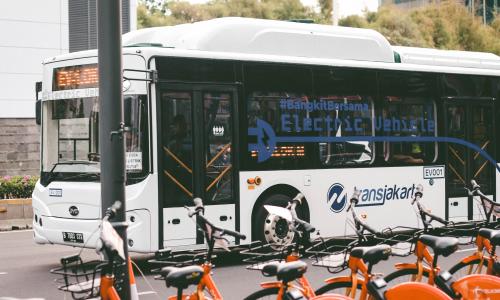
The Needs of Policy, Financing, and Market Support for E-Bus Acceleration in Indonesia
The G20 Summit in Bali last year underscored the continued urgency of decarbonizing the energy and transport sectors. In Indonesia, the transport sector accounts for over 27% of greenhouse gas emissions, and over 94% of these emissions come from road transport (car, motorcycle, and buses).
In an effort to reduce carbon emissions in the transport sector, the national government has introduced several programs including the national public transport program called Teman Bus, and enacting the Presidential Regulation No.55/2019 on the acceleration of electric vehicles (EV). In addition, several sub-national governments such as in Jakarta and Bali have shown their interest in enacting local e-mobility policy.
Seeing a significant interest in commitment and implementation of public transport electrification initiatives, TUMI E-Bus Mission, a global consortium consisting of GIZ, World Resources Institute, ITDP, ICCT, UITP, C40, and ICLEI, has chosen Jakarta to be included as one of its Deep Dive Cities, together with the 7 members of City Network1 namely Bandung, Medan, Pekanbaru, Bogor, Semarang, Denpasar, and Palembang.
The TUMI E-Bus Mission aims to support cities in their transition through e-bus deployment by providing technical assistance and capacity building, with a goal to procure more than 100,000 e-buses globally. In Indonesia, TUMI has attempted to identify the unique conditions of its City Network to understand the requirements for e-bus program implementation in the cities.
Learning from successful e-bus implementation in several countries, a vision setting and sustainable financing strategy are the two critical elements for e-bus implementation. Those elements must be supported by government regulations and relevant stakeholders’ contribution, including the Original Equipment Manufacturers (OEMs) and financial institutions. The “Indonesia E-Bus Roadmap and Financing Strategy Workshop” was held by WRI Indonesia in collaboration with ICLEI Indonesia and other TUMI partners in Jakarta on October 2022. The workshop explored how the policy, financing, and market support can play role as key enablers to accelerate the transition of e-buses in the country.
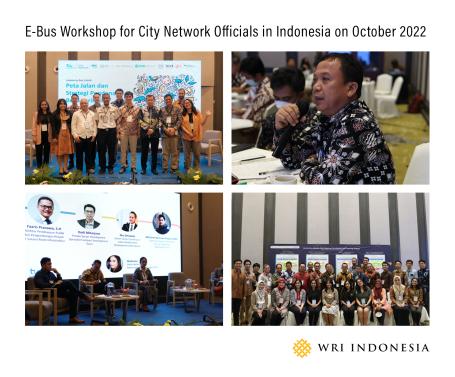
The Needs of Subnational Policy Support
The adoption of EVs, including e-buses, requires a fundamental shift in user behaviour and business ecosystems. The Ministry of Transportation has identified four essential aspects to overcome these challenges, which includes securing commitments from relevant stakeholders, enhancing the EV business ecosystem to attract investors, updating policies to better accommodate the acceleration of EVs including e-buses, as well as raising public awareness to change their perception and behaviour towards EV and public transportation.
To ensure the acceleration of EVs, the national policy should be complemented with regulations at the sub-national level. One of the best practices shown by the Government of Bali which enacted the Governor Regulation No. 48 Year 2019 on battery-based e-vehicle use. The regulation mandates two important actions for the development of the EV ecosystem in Bali, namely the establishment of a special committee of vehicle electrification to coordinate related stakeholders and to produce a regional action plan for e-vehicle implementation. The action plan was launched in January 2023 and is now active to become a vision and guideline for EV implementation in Bali.
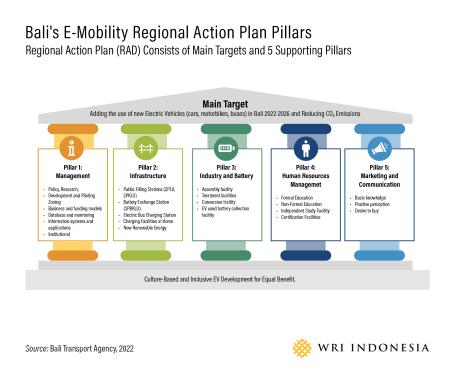
A Sustainable E-Bus Procurement and Financing Strategy
Procurement and funding often become challenges for e-bus implementation, especially in developing countries. Based on the extensive discussions with several sub-national governments of the City Network, we found that most cities didn’t have the fiscal capacity for e-bus procurement (capital expenditure). To answer this challenge, e-bus procurement should be treated and promoted as an investment or partnership opportunity. For example, the government could foster public-private partnerships to get investors for the infrastructure and fleet procurement. This way, the local government could implement e-bus projects even with a limited amount of budget.
In addition, there are various financing schemes available for sub-national governments to accelerate e-bus implementation. For instance, global financing mechanism like the Green Climate Fund (GCF) and development banks provide medium to long-term capital investments, and also offer technical assistance to support the transition towards sustainable and low-carbon transport systems.
The Public-Private Partnership (PPP) scheme also offers an alternative by enabling private capital to finance infrastructure projects, including e-bus procurement. The workshop discussed the urgency of having a government entity acting as the Government Contracting Agency (GCA). However, in most cities, it is still challenging to implement the scheme because the sub-national government has a lack of political interest in acting as GCA and most of the public transport authority was held by the management company. Additionally, the Indonesia Infrastructure Guarantee Fund (IIGF) provides financial guarantee products to support PPP schemes for infrastructure development in the transport sector.
These options show that the City Network has a wide range of alternative schemes that can support the funding of their e-bus projects.
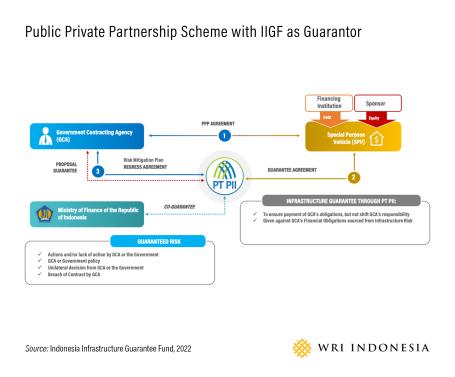
The Role of E-Bus Original Equipment Manufacturers (OEMs) in Indonesia E-Bus Market
It is believed that e-bus implementation in Indonesia can generate a wider economic impact (industrial development, battery production, and fleet manufacturing) and related stakeholders should take the opportunity to invest and collaborate in the ecosystem. Given a high financing risk particularly regarding cutting-edge battery technology, Original Equipment Manufacturers (OEMs) can play an important role as an enabler for local e-bus production. They can facilitate e-bus deployment and mitigate the risks associated with asset ownership of batteries, which is considered the most costly but necessary component of e-bus technology. This scenario could help to divide the financial burden as well as benefits for each party.
As a prominent local OEM, PT INKA has developed e-buses that incorporated the Domestic Component Level (TKDN) requirement by using 76.98% of local components. PT INKA also has sourced batteries, vehicle control units, and various other components into their innovative buses. Furthermore, they expanded their business unit by developing their own charging station as well as adopting the "Buy The Service" (BTS) scheme.
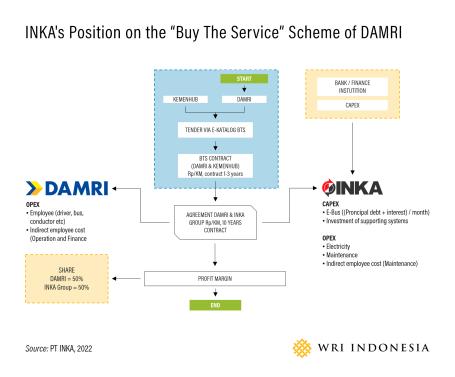
The BTS scheme allows PT INKA to collaborate with PT DAMRI, as a bus operational firm. In this scheme, PT DAMRI covers the operational expenditures and indirect costs for employees, while PT INKA is responsible for capital and operational expenditures for vehicle operations. This mutually beneficial scheme eliminates the need for the operator to independently procure e-buses and ensures regulated profits through agreement. Such an innovative scheme holds immense potential to be scaled up to further support the implementation of e-buses in Indonesia, thus accelerating the country's transition to sustainable transportation solutions.
1 City Network is a learning network of cities committed to accelerating the transition toward e-bus fleets within public transport systems in global South cities. In Indonesia, it includes the Cities of Bandung, Medan, Pekanbaru, Bogor, Semarang, Denpasar, and Palembang.
About TUMI
Transformative Urban Mobility Initiative (TUMI) is the leading global implementation initiative on sustainable mobility formed through the union of 11 prestigious partners. TUMI supports transport projects all around the world and enables policymakers to transform urban mobility. TUMI supports innovative pilot projects around the world and shares knowledge with planners about modern mobility concepts. Learn more about TUMI at transformative-mobility.org.
About TUMI E-Bus Mission
The TUMI E-Bus Mission is working with six global partners in 20 deep-dive cities to dramatically advance electric bus adoption across leading cities in the Global South. This mission is part of the Action Towards Climate Friendly Transport (ACT) initiative and TUMI, and is supported by the Federal Ministry for Economic Cooperation and Development (BMZ). Learn more about TUMI e-Bus Mission at: https://bit.ly/3pLcSN4